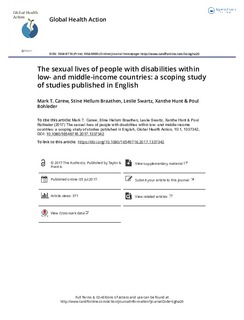| dc.contributor.author | Carew, Mark | |
| dc.contributor.author | Braathen, Stine Hellum | |
| dc.contributor.author | Swartz, Leslie | |
| dc.contributor.author | Hunt, Xanthe | |
| dc.contributor.author | Rohleder, Poul | |
| dc.date.accessioned | 2019-02-27T13:27:05Z | |
| dc.date.available | 2019-02-27T13:27:05Z | |
| dc.date.created | 2017-11-28T16:02:11Z | |
| dc.date.issued | 2017 | |
| dc.identifier.citation | Global health action, 2017, 10 (1), pp 8 | nb_NO |
| dc.identifier.issn | 1654-9880 | |
| dc.identifier.uri | http://hdl.handle.net/11250/2587843 | |
| dc.description.abstract | Background: Although approximately 80% of the global population of people with disabilities reside in low- and middle-income countries (LMICs), very little is known about their sexual lives due to a lack of empirical data. We aimed to provide a scoping review of English-language research conducted on disability and sexuality in LMICs. Objective: Our research questions concerned what topics in disability and sexuality have (and have not) been investigated, where this research has been carried out, and how this research has been conducted. Methods: A scoping review was conducted to examine the published English-language research literature on disability and sexuality within LMICs. We searched three electronic databases (PsycINFO, Web of Science, and PsycARTICLES) for research meeting these criteria published between 2000 and 2016 (inclusive). Through this search, we identified 103 articles. Results: It is concluded that: (a) disability and sexuality research in African countries has focused predominantly on sexual abuse and violence or HIV, (b) the sexuality of people with disabilities within many LMICs has received little or no empirical investigation, and (c) there have been very few experimental studies on disability and sexuality conducted in LMICs in general. Conclusions: Much remains unknown about the sexual health and sexual lives of the majority of people with disabilities, globally. Moreover, what has been done in certain contexts has tended to focus predominantly on vulnerabilities rather than emancipatory practices. Thus, urgent action is needed within LMICs on issues related to disability and sexuality to meet the goal of global optimal sexual health. | nb_NO |
| dc.language.iso | eng | nb_NO |
| dc.rights | Navngivelse 4.0 Internasjonal | * |
| dc.rights.uri | http://creativecommons.org/licenses/by/4.0/deed.no | * |
| dc.title | The sexual lives of people with disabilities within low- and middle-income countries: A scoping study of studies published in English | nb_NO |
| dc.type | Journal article | nb_NO |
| dc.type | Peer reviewed | nb_NO |
| dc.description.version | publishedVersion | nb_NO |
| dc.source.pagenumber | 8 | nb_NO |
| dc.source.volume | 10 | nb_NO |
| dc.source.journal | Global health action | nb_NO |
| dc.source.issue | 1 | nb_NO |
| dc.identifier.doi | 10.1080/16549716.2017.1337342 | |
| dc.identifier.cristin | 1519765 | |
| cristin.unitcode | 7401,60,25,0 | |
| cristin.unitname | Helse | |
| cristin.ispublished | true | |
| cristin.fulltext | original | |
| cristin.qualitycode | 1 | |

